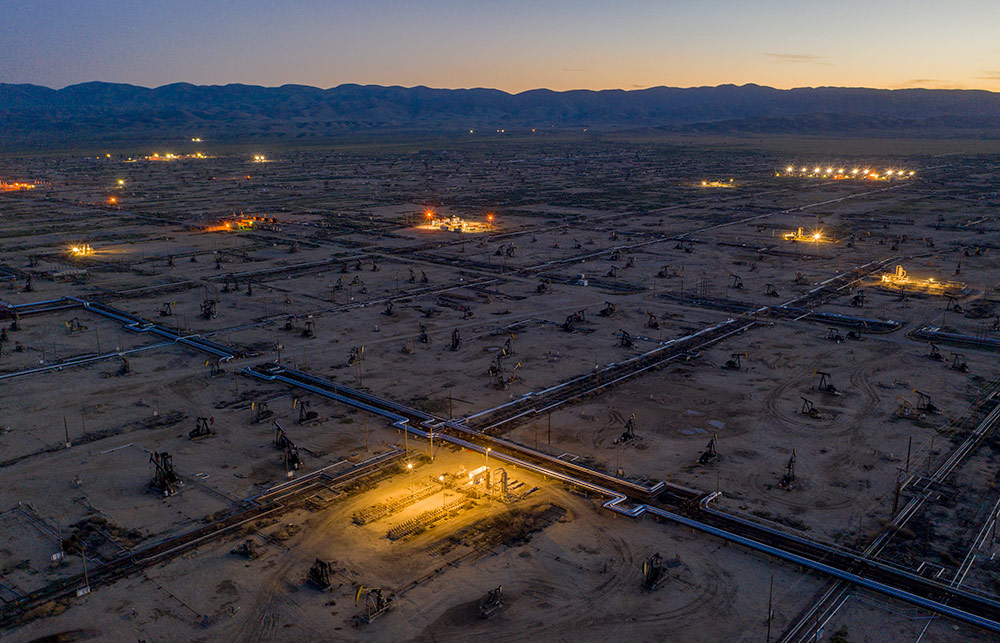本周二,荷蘭皇家殼牌發布預警稱,今年第二季度該公司資產最多將減值220億美元。隨著新冠疫情重塑全球需求,越來越多的公司開始估算石油和天然氣悲慘的經濟性,殼牌則是其中最大的一家。
這筆創紀錄的資產減值也初步預示出該行業今后的狀況。作為全球最大的非國有油氣生產商,殼牌還面臨著一個更艱巨的挑戰,那就是擺脫化石燃料并轉型,從而大幅降低自身的碳排放。
今年4月,殼牌曾經表示其目標是到2050年實現零排放,從而達到《巴黎協定》的要求。殼牌于本周一發布了資產減值公告,而就在兩周前,英國大型能源公司英國石油,同時也是世界第二大非國有能源企業預測自身資產將減值175億美元左右。今年2月,英國石油做出了和殼牌一樣的減排承諾,是全球范圍內率先邁出這一步的大型石油企業。
能源數據公司Wood Mackenzie負責企業分析的副總裁盧克?帕克在周二發表報告稱:“殼牌披露的減值不光是會計處理方法,或者對短期價格預測的調整。它代表著席卷整個石油和天然氣行業的根本性變化。”
“通過本次減值,殼牌向我們透露了有關其擱淺資產的信息,就像英國石油在幾周前所做的那樣。”
本次大幅減值背后有兩大因素——短期價格評估和長期氣候策略。很難將二者分離開來。

短期而言,世界各國的封城措施和經濟危機造成全球能源需求下降,這讓石油和天然氣價格受到沖擊,進而迫使企業重新評估它們的價格預期。但同時,這些公司預測的油氣價格仍然處于盈利水平。
重估預期加快了眾多公司的資產減值步伐,出現這種局面的時間實際上比疫情還早幾個月。美國頁巖油氣行業的危機尤其嚴重,因為這些公司債臺高筑,而天然氣供給過剩又讓全球油價持續下滑。
位于奧斯陸的咨詢公司Rystad Energy發布的數據顯示,今年第一季度危機剛剛出現時,頁巖油氣公司的資產就已經減值380億美元。分析師們認為它們的資產減值只會越來越多。德勤就在本月初的報告中稱,從第二季度開始,上述資產減值數字有可能達到至少3000億美元。
這樣的形勢還讓一些公司直接破產。本周初,又一家公司因為需求不斷滑坡而倒下——頁巖油行業先鋒切薩皮克能源宣布破產。國際能源署則預測,今年油氣需求將出現前所未有的下降。
不過,殼牌和英國石油的高額資產減值不光意味著經濟上的困難。到目前為止,對于如何在今后20年里快速轉型為低排放企業,兩家公司幾乎均未給出具體細節。但這樣的轉型顯然要依靠一項簡單的措施,那就是將油氣行業未開采的諸多化石燃料資源留在地下,并將其價值歸零。
因此,這些所謂的擱淺資產必須清除,而盤踞在《財富》世界500強榜單前列的石油和天然氣公司以及能源依賴型經濟的整體價值也將隨之轉變。對于這些公司的資產減值規模,外界預測不一,但往往都達到數十億美元,甚至上萬億美元。
《金融時報》的一篇分析文章估算,要實現本世紀全球氣溫升幅不超過1.5攝氏度的目標,主要油氣公司的總價值有可能蒸發9000億美元,約占今年2月其總價值的三分之一。去年9月,獨立金融研究機構Carbon Tracker Initiative預測,按照《巴黎協定》的目標,到2030年,整個油氣行業有可能得放棄價值2.2萬億美元的資產。
帕克指出,上述資產減值釋放的另一個信號可能關乎整個行業的根本性變化。
他說:“以后需求也許會上升,而且許多公司仍然想從這樣的增長中分一杯羹。但毫無疑問,企業所處的格局正在發生變化,那些大型公司也將隨之做出改變。”(財富中文網)
譯者:Charlie
本周二,荷蘭皇家殼牌發布預警稱,今年第二季度該公司資產最多將減值220億美元。隨著新冠疫情重塑全球需求,越來越多的公司開始估算石油和天然氣悲慘的經濟性,殼牌則是其中最大的一家。
這筆創紀錄的資產減值也初步預示出該行業今后的狀況。作為全球最大的非國有油氣生產商,殼牌還面臨著一個更艱巨的挑戰,那就是擺脫化石燃料并轉型,從而大幅降低自身的碳排放。
今年4月,殼牌曾經表示其目標是到2050年實現零排放,從而達到《巴黎協定》的要求。殼牌于本周一發布了資產減值公告,而就在兩周前,英國大型能源公司英國石油,同時也是世界第二大非國有能源企業預測自身資產將減值175億美元左右。今年2月,英國石油做出了和殼牌一樣的減排承諾,是全球范圍內率先邁出這一步的大型石油企業。
能源數據公司Wood Mackenzie負責企業分析的副總裁盧克?帕克在周二發表報告稱:“殼牌披露的減值不光是會計處理方法,或者對短期價格預測的調整。它代表著席卷整個石油和天然氣行業的根本性變化。”
“通過本次減值,殼牌向我們透露了有關其擱淺資產的信息,就像英國石油在幾周前所做的那樣。”
本次大幅減值背后有兩大因素——短期價格評估和長期氣候策略。很難將二者分離開來。
短期而言,世界各國的封城措施和經濟危機造成全球能源需求下降,這讓石油和天然氣價格受到沖擊,進而迫使企業重新評估它們的價格預期。但同時,這些公司預測的油氣價格仍然處于盈利水平。
重估預期加快了眾多公司的資產減值步伐,出現這種局面的時間實際上比疫情還早幾個月。美國頁巖油氣行業的危機尤其嚴重,因為這些公司債臺高筑,而天然氣供給過剩又讓全球油價持續下滑。
位于奧斯陸的咨詢公司Rystad Energy發布的數據顯示,今年第一季度危機剛剛出現時,頁巖油氣公司的資產就已經減值380億美元。分析師們認為它們的資產減值只會越來越多。德勤就在本月初的報告中稱,從第二季度開始,上述資產減值數字有可能達到至少3000億美元。
這樣的形勢還讓一些公司直接破產。本周初,又一家公司因為需求不斷滑坡而倒下——頁巖油行業先鋒切薩皮克能源宣布破產。國際能源署則預測,今年油氣需求將出現前所未有的下降。
不過,殼牌和英國石油的高額資產減值不光意味著經濟上的困難。到目前為止,對于如何在今后20年里快速轉型為低排放企業,兩家公司幾乎均未給出具體細節。但這樣的轉型顯然要依靠一項簡單的措施,那就是將油氣行業未開采的諸多化石燃料資源留在地下,并將其價值歸零。
因此,這些所謂的擱淺資產必須清除,而盤踞在《財富》世界500強榜單前列的石油和天然氣公司以及能源依賴型經濟的整體價值也將隨之轉變。對于這些公司的資產減值規模,外界預測不一,但往往都達到數十億美元,甚至上萬億美元。
《金融時報》的一篇分析文章估算,要實現本世紀全球氣溫升幅不超過1.5攝氏度的目標,主要油氣公司的總價值有可能蒸發9000億美元,約占今年2月其總價值的三分之一。去年9月,獨立金融研究機構Carbon Tracker Initiative預測,按照《巴黎協定》的目標,到2030年,整個油氣行業有可能得放棄價值2.2萬億美元的資產。
帕克指出,上述資產減值釋放的另一個信號可能關乎整個行業的根本性變化。
他說:“以后需求也許會上升,而且許多公司仍然想從這樣的增長中分一杯羹。但毫無疑問,企業所處的格局正在發生變化,那些大型公司也將隨之做出改變。”(財富中文網)
譯者:Charlie
When Royal Dutch Shell warned it will write down up to $22 billion in assets in the second quarter on Tuesday, it became the largest of an expanding group of companies to face a reckoning over the brutal economics of oil and gas as the coronavirus pandemic has warped global demand.
The record write-down for the company also provided an initial signal of what’s to come, as the world’s largest non–state-owned oil and gas company faces an even larger challenge: its own transition away from fossil fuels, in a bid to dramatically reduce its emissions.
In April, the Anglo-Dutch giant announced it would target net zero emissions by 2050, in order to align with the Paris Agreement. Its write-down announcement on Monday comes just two weeks after British energy giant BP, the world’s second largest non–state-owned energy company, said it expected to write down roughly $17.5 billion worth of assets. BP made the same commitment to cut emissions in February, then the first major oil company in the world to do so.
“The impairment Shell has announced is about more than an accounting technicality, or an adjustment to near-term price assumptions. It’s about fundamental change hitting the entire oil and gas sector,” said Luke Parker, vice president of corporate analysis at consultancy Wood Mackenzie, in a note on Tuesday.
“Within this write-down, Shell is giving us a message about stranded assets, just like BP did a few weeks ago.”
The two threads behind the massive write-downs—shorter-term price assessments and longer-term climate strategy—are difficult to separate.
In the nearer term, the decline in global energy demand owing to worldwide lockdowns and economic crises has rocked oil and gas prices, and forced companies to reassess their price forecasts—and therefore, which of their projects will still be profitable.
That reassessment has accelerated a spate of write-downs that had in fact begun months before the pandemic arrived. The U.S. shale sector in particular went into the crises struggling under the weight of sky-high debt levels and a glut of gas that had sent global prices spiraling downward.
In the first quarter, as the crisis was only beginning to take hold, shale companies alone wrote off $38 billion in assets, according to Rystad Energy, an Oslo-based consultancy. Analysts estimate those write-downs have only picked up steam, with Deloitte predicting in a report earlier this month that write-downs could hit at least $300 billion beginning in the second quarter.
Those same dynamics have also spurred outright bankruptcies. Earlier this week, the declining demand—which the International Energy Agency estimates will be the largest drop on record this year—claimed another victim, as shale pioneer Chesapeake Energy declared bankruptcy.
But Shell’s and BP’s hefty write-downs have more significance than economic hardship. Both companies have so far given little concrete detail about how they will transition rapidly to becoming low-emission companies within the next two decades. But such transitions are clearly dependent on a simple fact: Many of the industry’s unexploited fossil fuel resources will have to be left in the ground, eliminating their value.
Those so-called stranded assets will, as a result, have to be written off, transforming the value of oil and gas companies—a sector that dominates the top of the Fortune Global 500—and energy-dependent economies as a whole. Estimates of the scale of those write-downs vary, but they tend to be in the billions or trillions.
An analysis by the Financial Times estimated that enforcing a temperature rise below 1.5 degrees Celsius this century would wipe $900 billion in collective value off the largest oil and gas companies, or about one-third of their value as of February. Last September, the Carbon Tracker Initiative estimated oil and gas companies risked wasting a collective $2.2 trillion by 2030 on assets that would have to be abandoned under Paris Agreement–level targets.
The write-downs may also send a signal about a fundamental shift across the wider sector, notes Parker.
“Demand might still grow from here, and many companies are still chasing a share of that growth,” he said. “But make no mistake, the corporate landscape is changing, and the majors are changing with it.”






